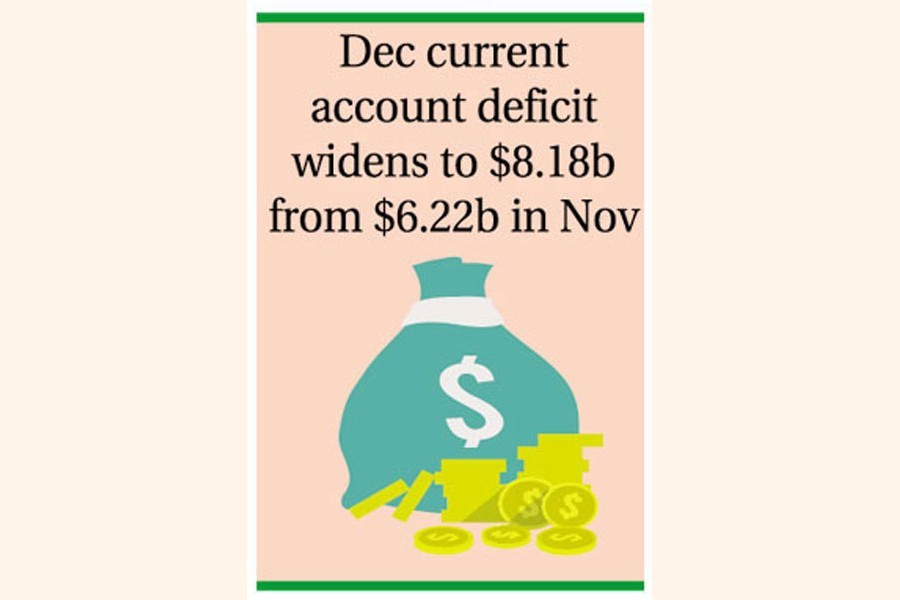Bangladesh's current-account balance gets under growing strains as import spending far outstrips the country's export earnings and remittance also slims, officials say.
Such lower receipts of foreign exchange through the two main channels pushed up the pressure on the balance in the first half (H1) of the current fiscal year (FY), 2021-22, they say.
The current-account deficit widened to $8.18 billion during the July-December period of FY'22 from $6.22 billion a month before, according to the central bank's latest statistics.
The balance was $3.51-billion surplus in the same period of FY'21.
In fact, the pressure on current-account balance has started in recent months following higher import-payment obligations along with lower inflow of remittances.
"The ongoing rising trend in current-account deficit may continue in the coming months if the lower inflow of remittances and higher import expenses persist," a senior official of the Bangladesh Bank (BB) told the FE Wednesday.
Remittance inflow dropped by nearly 21 per cent to $10.24 billion in the first six months of FY'22 from $12.94 billion in the same period of FY'21as money transfers through informal channels such as hundi resurfaced after a lull caused by the coronavirus pandemic.
Pressure on exchange rate of the depreciating local currency may increase if the upward trend in current-account deficit continues in the near future, the central banker noted.
Meanwhile, trade deficit of the country more than doubled in the first six months of the current FY mainly due to higher import-payment pressure on the economy.
The trade deficit with the rest of the world increased by 127.21 per cent or US$8.74 billion to $15.62 billion during the July-December half of FY'22 from $6.87 billion in the same period of the previous fiscal year.
During the period under review, import expenses jumped by more than 54 per cent while export earnings recorded a 27.25-per cent growth.
The overall import cost stood at $38.97 billion in the July-December period against $25.23 billion in the same period a year before while export earnings rose to $23.35 billion from $18.35 billion.
Actually, Bangladesh's foreign trade covering import and export increased significantly during the period under review amid gradually reopening economic activities, both domestic and global, after more than one year of slump mainly due to the Covid-19 pandemic.
Besides, higher prices of essential commodities, including petroleum products, on the global market also bloated the country's import bill during the period under review, according to the officials.
On the other hand, the financial account's surplus improved significantly following higher inflows of medium-and long-term loans as well as aid flows, they say.
The financial account's surplus rose to $6.68 billion during the July-December period of FY'22 from $2.22 billion in the same period of the last fiscal year.
"The government borrowing from overseas sources has increased significantly during the period under review to face the Covid-19 pandemic situation," another BB official said while replying to a query.
The inflow of medium-and long-term loans increased by 101.45 per cent to $4.02 billion in the H1 of FY'22 from $1.20 billion in the same period of the FY'21, BB data show.
Actually, the soaring deficit in trade as well as the current account reflects the growing imbalance of the external account, thus creating mounting pressure on the country's overall balance of payments (BoP).
The BB data show that the BoP posted a negative balance of $1.79 billion in the first six months of FY'22 against a positive balance of $6.15 billion in the same period of FY'21.
Talking to the FE, Mustafa K Mujeri, executive director of the Institute for Inclusive Finance and Development (InM), suggested that the policymakers should take effective measures to contain the BoP deficit.
"It may fuel the inflationary pressure on the economy," he notes.
Mr Mujeri, also a former chief economist of the BB, says export earnings along with the flow of inward remittances should be expedited to curb the rising trend in trade deficit.
"Unnecessary imports should be discouraged to ease import-payments pressure on the economy," the senior economist adds.


